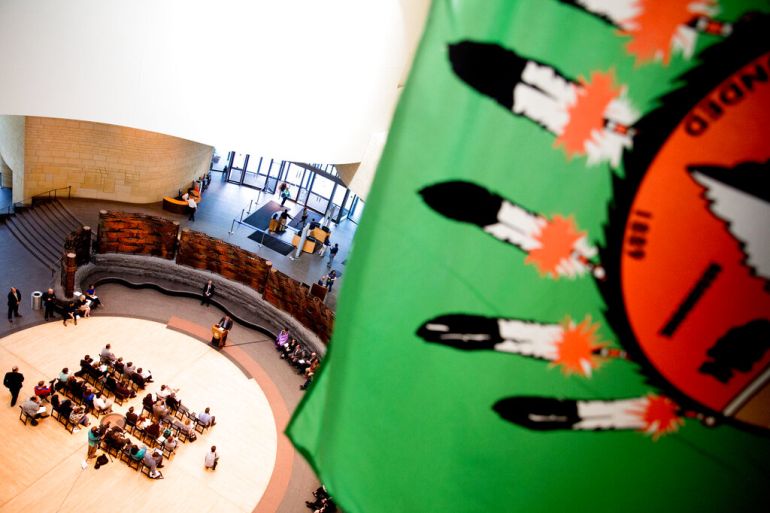Native American remains, burial objects to be returned in Alabama
Nearly 110,000 Native American human remains are still in the possession of colleges and museums across the US.

The Alabama Department of Archives and History is beginning the process of returning the remains of Native Americans and their funerary objects held in its archives.
The department also announced that it had removed Native American funerary objects from displays where the artefacts had sat for years, viewed by school groups and other visitors.
Keep reading
list of 4 itemsNative Americans share long-ignored Thanksgiving truths
Native American women are facing an epidemic of violence
US opioid crisis: Native American tribes reach $590m settlement
The Associated Press news agency reported last month that 870,000 Native American artefacts – including nearly 110,000 human remains – are still in the possession of colleges, museums and other institutions across the United States, according to data maintained by the National Park Service.
“The origins of those materials and the way they came into our possession is really quite problematic from today’s perspective,” Steve Murray, the director of the Alabama Department of Archives and History, said on Thursday.
“We very much honour and agreed with Native perspectives on what is and isn’t a proper type of material to show in a museum exhibition,” Murray said.
The funerary objects were “the personal property of someone who was buried and then that burial was later disturbed without permission”, he said.
![The entrance to the to an exhibit about Native Americans in Alabama is closed to the public at the Alabama Department of Archives and History in Montgomery, Alabama, on Thursday, Aug. 11, 2022 [Kim Chandler/AP]](/wp-content/uploads/2022/08/AP22223789378582.jpg?w=770&resize=770%2C514)
The 1990 federal Native American Graves Protection and Repatriation Act requires federally funded institutions, such as universities, to return Native American remains and cultural items to lineal descendants, Indian Tribes and Native Hawaiian organisations.
The return, however, has been slow to happen.
The first materials to be returned to Native American communities from the Alabama archives will be 37 sets of human remains and 349 associated funerary objects that were excavated from burials at two sites in Montgomery and Lowndes counties in the early 1900s.
The graves were of people who lived in Alabama in the 18th century, although some dated back to the 1600s, Murray said.
State archives have a total of 114 sets of remains taken from 22 sites across the state plus the objects that were buried with those people, he said.
The remains of Native American people who once lived in Alabama were dug – often by amateur archaeologists – and given to the state along with the jewellery, urns and other objects buried with them.
University of Alabama museums are the largest holder of Native American remains and artefacts in Alabama.